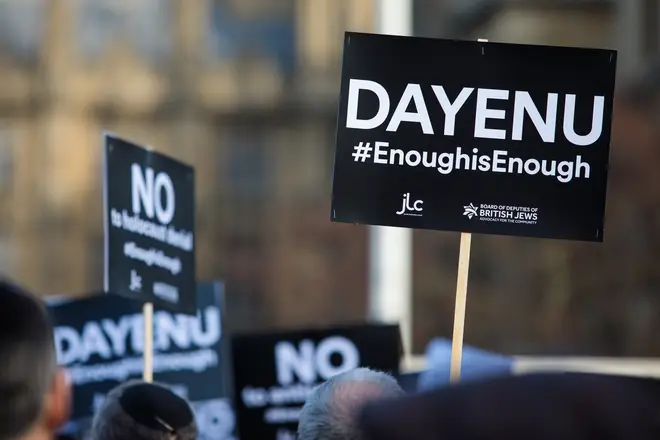
Matthew Wright 7am - 10am
5 August 2021, 12:56 | Updated: 5 August 2021, 13:49

More than 1,000 anti-Jewish hate incidents have been recorded across the UK this year – a 49% rise from the first half of 2020.
It is the highest total the group behind the research, the Community Security Trust (CST), has ever logged in the first half of a year.
The CST said the huge rise came amid anti-Jewish hate during Israel's conflict with Hamas in Gaza and after.
CST Chief Executive Mark Gardner said: "This year British Jews have suffered levels of hatred that were worse than anything seen in recent decades. Some of the abuse and harassment targeting young people in particular was disgraceful.
"Looking ahead, CST will keep doing everything that we can to protect our Jewish communities, and to give them the security and comfort that they need."
In May, a monthly record of 639 antisemitic incidents was logged, accounting for half of all this year's incidents.
The report also found 130 anti-Jewish hate incidents involving schools, students and teachers, a rise of 491% from the 22 logged in the first six months of 2020.
A total of 89 violent antisemitic incidents were logged, including two considered to have involved potential GBH or a threat to life.
More than 1,000 instances of abusive behaviour, such as verbal abuse or antisemitic graffiti, were seen.

David Baddiel on the double edged sword of antisemitism
There were 748 antisemitic incidents in Greater London.
A further 396 incidents were also noted by the CST throughout the UK but were not deemed to be antisemitic, which included potentially "hostile reconnaissance" at Jewish locations and criminal activity affecting Jewish people and buildings.
The most commonly seen language or imagery used referenced the conflict, showed anti-Zionist political motivation or both, the CST said.
There were 43 incidents where Israel was compared with Nazi Germany.
The CST also recorded 277 incidents where far-right or Nazi-related discourse was used, along with 59 incidents that showed far-right political motivation, the CST added.
"The surge in incidents correlating with conflict in the Middle East also coincided with the relaxation of COVID-19 restrictions, and continued a pattern in which the peaks and troughs of recorded antisemitism corresponded with the severity of governmental restrictions on public or collective activity," the group said.
"In January 2021 just 89 antisemitic incidents were reported to CST, the lowest monthly total recorded since December 2017 (86 incidents) and only the second month since then in which CST recorded fewer than 100 antisemitic incidents, with December 2020 (90 incidents) the other.
"In contrast, May saw the relaxation of many pandemic-related restrictions. It is possible that the loosening of social regulations, coinciding with the war in Israel and Gaza - a subject that triggers strong emotional responses - provided people with a potential release from months of lockdown-induced frustration."
The CST also found that the pandemic caused people to express antisemitism in other ways. There were 10 instances of "zoombombing", an intrusion on a video call, and instances where antisemitic rhetoric was linked to conspiracy theories about Covid.